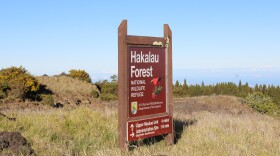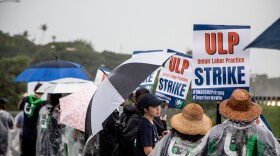The Kona Coffee Farmers Association held its annual symposium Tuesday on Hawaiʻi Island. The coffee was delicious, per usual, but the day's agenda was a stark reminder of the many hurdles facing local farmers who grow the beans for Kona's beloved brews.
That list includes invasive species, climate change, and now uncertainty over federal support for the famed Kona coffee region.
Coffee farmer Suzanne Shriner said the conditions for growing coffee today are a far cry from what they were when she got her start in Kona 20 years ago.
"It used to be very easy. We didn't have many pests or diseases," she said. "Now, there's a lot more challenges."
During Shriner’s two decades on her South Kona coffee farm, she’s seen the industry endure two major calamities.

The first was the coffee berry borer beetle, an introduced pest that was identified on Hawaiʻi Island in 2010.
The borer beetle burrows into coffee beans and eats them from the inside out, causing hundreds of millions of dollars in losses to the global coffee industry each year. Prior to 2010, Hawaiʻi was one of the few remaining coffee-growing regions in the world where the borer beetle was not present.
Then came coffee leaf rust, a fungal disease that damages leaves and hinders the ability of coffee trees to photosynthesize.
"Coffee leaf rust showed up in 2020, at the height of the pandemic, and it was one of those 'are you kidding me?' moments," Shriner said. "It was our worst-case scenario."
Shriner estimated that most Kona farmers lost about half their yield in the first harvest season after coffee leaf rust became widespread.
"Some growers lost 80% of their crop… Last year, we got it back up to a little closer to normal, but I think this year is going to be another bad year," she said.
Research to help coffee farmers is on the chopping block
And now, federal funding freezes and staff cuts at the U.S. Department of Agriculture directed by the Trump administration may also have a chilling effect on critical research into coffee blight.
Shriner serves as the administrator for the Synergistic Hawaiʻi Agriculture Council, which received a $6 million federal grant from the USDA to support research into coffee leaf rust.
A few weeks ago, about $2.8 million of the grant's remaining funds were frozen without explanation. They have since been unfrozen by a court injunction, but Shriner said its permanent status is unknown once the injunction expires on March 14.
"If that funding was lost, our scientists wouldn't be able to continue working on it the way that they are. They're working for the long-term solutions," she said.
It's not just research on the chopping block. The people behind the research have been fired, including several members of the Hilo office of the USDA’s Agricultural Research Service.
A member of the Hilo ARS office spoke to HPR on the condition of anonymity, as they had not been authorized to speak publicly on the subject. They said that six people had lost positions. Additionally, an entomologist and a geneticist had been fired, but were then reinstated over the weekend.
Shriner said she was relieved to hear those scientists had been allowed to return to work.
"But it's also really terrifying for them to be told they're being fired without cause two weeks ago and to spin out there for two weeks thinking they were going to lose their job," she said. "It instills a culture of fear that is really hard to watch from the outside."
She added that it's especially tough to see these cuts at a time when the Kona coffee industry needs all the help it can get.
"We are facing an existential moment, and I'm not sure we can properly document in this moment what Kona is going to look like in 10 years, because there's so much change happening within our crop and within the larger world," she said.
"But we have to save it. It's really important."






